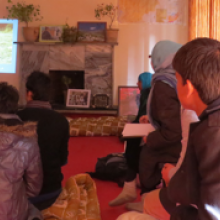defense budget
Two weeks ago in a room in Kabul, Afghanistan, I joined several dozen people — working seamstresses, some college students, socially engaged teenagers, and a few visiting internationals like myself — to discuss world hunger. Our emphasis was not exclusively their own country’s worsening hunger problems. Rather, tmhe Afghan Peace Volunteers, in whose home we were meeting, draw strength from looking beyond their own very real struggles.
With us was Hakim, a medical doctor who spent six years working as a public health specialist in the central highlands of Afghanistan and, prior to that, among refugees in Quetta, Pakistan. He helped us understand conditions that lead to food shortages and taught us about diseases, such as kwashiorkor and marasmus, which are caused by insufficient protein or general malnutrition.
We looked at U.N. figures about hunger in Afghanistan, which show malnutrition rates rising by 50 percent or more compared with 2012. The malnutrition ward at Helmand Province’s Bost Hospital has been admitting 200 children a month for severe, acute malnutrition — four times more than in January 2012.
A recent New York Times article about the worsening hunger crisis described an encounter with a mother and child in an Afghan hospital: “In another bed is Fatima, less than a year old, who is so severely malnourished that her heart is failing, and the doctors expect that she will soon die unless her father is able to find money to take her to Kabul for surgery. The girl’s face bears a perpetual look of utter terror, and she rarely stops crying.”
Photos of Fatima and other children in the ward accompanied the article. In our room in Kabul, Hakim projected the photos on the wall. They were painful to see and so were the nods of comprehension from Afghans all too familiar with the agonies of poverty in a time of war.
Play along with me. If you had $1 million to spend to help stimulate the economy, what would you do? What would I do?
Option 1:
Give the money to a billionaire, in the blind hope that the billionaire will pass along that million to his employees in some form. Or that he’ll spend it on a nice luxury product that (hopefully) will be an American product. Or that he won’t exercise the many loopholes that still exist and he’ll give that whole amount back to the U.S. government to spend. And of course, pray that the money won’t go into an offshore investment account somewhere in the Caribbean or Switzerland.
But what would Jesus do? What investments would Jesus make that I would want to make as well?
This coming fiscal year, the United States is set to spend more than $640 billion dollars on the Pentagon and war, accounting for more than 60 percent of federal domestic spending. In excess of $85 billion of that will be spent on the war in Afghanistan alone.
This unfathomable amount of money was approved by the House of Representatives in the National Defense Authorization Act. These funds will serve to bring suffering and pain to innocent people, further militarize the world and undermine peace and stability for generations to come—all on the backs of those who struggle at home.
In the backdrop of such spending, we’re told that we’re in a financial crisis. Elected officials tell us it is time to make tough choices. There isn’t enough money for programs like “Meals on Wheels” and for ensuring everyone has access to adequate healthcare. Our schools and bridges must wait to be repaired. New roads and schools must remain unconstructed.
Yet some of us know better.
 CLICK HERE TO HELP PROTECT POVERTY PROGRAMS FROM FEDERAL BUDGET CUTS (and get an "End Poverty" or "Wage Peace" bumper sticker.)
CLICK HERE TO HELP PROTECT POVERTY PROGRAMS FROM FEDERAL BUDGET CUTS (and get an "End Poverty" or "Wage Peace" bumper sticker.)
House Republicans announced a plan yesterday to cut $43 billion in domestic spend


